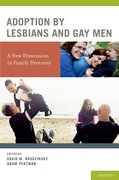By Adam Pertman
Politicians love to say it. Child-welfare professionals work mightily to practice it. American laws and practices promote its essential truth: every boy and girl deserves to live in a permanent, loving family.
Yet tens of thousands of children in the U.S. spend their lives in temporary (i.e. foster) care, unable to return to their original families and without great prospects for being adopted into new ones. At the same time, the number of gays and lesbians becoming adoptive parents increases daily. This reality has raised hopes throughout our country among children’s advocates who see an underutilized supply of prospective mothers and fathers for so-called “waiting children.”
Across the United States, however, some conservative interest groups and politicians have worked in recent years to implement laws and policies that would prevent lesbians and gay men from providing homes for these boys and girls, and a few such efforts have been successful. The good news is that the research on this subject is almost unanimously one-sided–that is, it shows that non-heterosexuals make good parents, and their children do well (see the Evan B. Donaldson Adoption Institute’s report on the subject, “Expanding Resources for Children“). And, in the legal realm, the latest news is positive, too: the Arkansas Supreme Court recently struck a blow for best practices in child welfare by striking down a 2008 referendum–which allowed only married couples to foster or adopt a child from state care–as unconstitutional.
The bad news is that proponents of such measures are continuing to formulate legal and procedural strategies to accomplish their goal. Some of the activists engaged in the gays-shouldn’t-be-parents campaign acknowledge that they believe non-heterosexuals are problematic simply because of who they are. But most maintain, at least publicly, that they are motivated primarily by a desire to do what’s best for the kids who need families.
It is not homophobia, they insist, to establish rules that promote the benefits of parenting by both a mother and a father who are married to each other. They frequently add that preventing gay men and lesbians from adopting protects children from being negatively influenced, or even physically harmed, by the adults who are supposed to protect them.
Such arguments are, at best, ill-informed and, in many cases, plainly disingenuous. If politicians and others who make those assertions truly believe their own words, they should act quickly to remove the millions of supposedly at-risk girls and boys who are already in families in which one or both parents are gay. More urgently, they should swoop children out of single-parent homes, since those families deprive far more children of two married, cohabitating, heterosexual parents than any other cultural phenomenon in history.
Those are silly suggestions, of course, and no one is going to follow them (though there probably are some people who want to).
The Evan B. Donaldson Adoption Institute, which I head, is not a gay/lesbian advocacy organization. We conduct independent, nonpartisan research and education projects on a broad range of subjects in order to improve the lives of everyone touched by adoption–especially children–through better laws, policies and practices.
Among the many reports we have published over the last several years are three about gay and lesbian adoption. They contain no shockers; in fact, they simply affirm what previous research has found: that children grow up healthier in loving families than in temporary care, including when the families are headed by qualified (training, vetting and oversight are all parts of the placement process) lesbians or gay men.
That is why a broad range of professional organizations–including the American Academy of Pediatrics, the American Association of Family Physicians, the National Association of Social Workers and the Child Welfare League of America–has come to the same conclusion as we have at the Adoption Institute. These are not fringe groups that would put kids at risk, but just the opposite. The common threads among all of the organizations listed here is that we are in the mainstream and we all work, based on the best available information, for the welfare of children. And we all agree that allowing adoption by qualified gay men and lesbians furthers that objective.
Not incidentally, most adoption practitioners in our country have come to the same conclusion. Indeed, one study by the Adoption Institute showed that a growing majority of agencies nationwide accepts applications from gay and lesbian prospective parents, and at least 40 percent have placed children with them. Again, the social workers, therapists and other professionals at these agencies aren’t in business to hurt boys and girls but to improve their lives. And they’ve decided that that occurs when children stop shuttling between foster homes and are firmly ensconced in permanent ones.
The bottom line is simple: no state can effectively prevent lesbians or gay men from becoming mothers or fathers, because they can do so in other ways–such as surrogacy and insemination–or by moving somewhere that permits them to foster or adopt children. So all a state can accomplish if it imposes restrictions, as Arkansas tried to do and as Utah and Mississippi still do, is to shrink the pool of prospective parents and, as a result, decrease the odds that children in its custody will ever receive the benefits of living in permanent, successful families.
Adam Pertman is Executive Director of the Evan B. Donaldson Adoption Institute, a former Pulitzer-nominated journalist, Associate Editor of Adoption Quarterly, and the author of Adoption Nation: How the Adoption Revolution is Transforming Our Families.
A version of this post also appeared on Huffington Post.
Subscribe to the OUPblog via email or RSS.
View more about this book on the ![]()
![]()




Recent Comments
There are currently no comments.